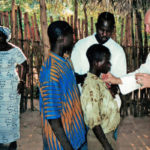By Jenna Ebener
Fear is a concept I have been pondering lately. There seem to be many reasons to be fearful: the impacts of COVID-19, ranging from sickness and death to economic loss; evidence of the continuation of racism; riots; the direction of leadership, at small and large levels; and even the weather as wildfires rage in many states.
 While fear may be more prone to come to the surface of our minds now, it has always been there. I think back to when I agonized over the decision to go train with our future facility dog during what seemed at the time to be horrible timing. A deacon friend helped me recognize that fear was holding me back. That clarity helped release the hold of fear over me and made it possible to participate in that two-week training, a decision that has harvested more fruit than I could have imagined.
While fear may be more prone to come to the surface of our minds now, it has always been there. I think back to when I agonized over the decision to go train with our future facility dog during what seemed at the time to be horrible timing. A deacon friend helped me recognize that fear was holding me back. That clarity helped release the hold of fear over me and made it possible to participate in that two-week training, a decision that has harvested more fruit than I could have imagined.
More recently, I was overcome by fear before returning to work at our school for students who are medically fragile. Six students died last year, most due to respiratory issues, without COVID-19 as an additional risk factor. When I acknowledged feeling the fear of pain in having to watch others die, I was able to offer that fear to God and replace it with peace.
Fear can become a part of any situation if we give it that power. It is so easy to let our thoughts spiral to the what-ifs and imagine the possible ripple effect of certain events or actions. However, the devil can use this unknown aspect of the future along with our experiences to fuel fear from a spark into a wildfire. Life is full of challenges, especially when we follow God’s will. Those challenges may not get easier, but we can control our response. Instead of focusing on how we think the world should be, “[w]e must put everything, without exception, into the hands of God” (“Searching for and Maintaining Peace: A Small Treatise on Peace of Heart,” Father Jacques Philippe, p. 37). For God understands and empathizes with our suffering, and “it is very often the case that just when the soul believes itself lost that it gains and profits most” (“Searching”, Phillippe, p. 44).
Some of the times that I have felt God’s presence most strongly happened when I gave up on my own strength and pleaded to God in desperation. When I gave up on finding my lost house key late at night in a snowstorm after my phone died, I turned it over to God and found my key. When I was distraught over a student who had been extremely self-injurious, I turned to God in journaling and finally felt peace. There are plenty of reasons to be afraid, but God has given us the tools to overcome that fear. We need to acknowledge our fear and recognize that the power to overcome it comes from God. “So do not fear, for I am with you; do not be dismayed, for I am your God. I will strengthen you and help you; I will uphold you with my righteous right hand” (Is. 41.10).
When I was praying a virtual rosary, the priest gave me a new perspective on the concept of fear. Fear can mean, “flee everything and run” or “face everything and rise” (Father Patrick Smith). What power are you going to let fear hold over you? “I sought the Lord, and he answered me and delivered me from all my fears. Those who look to him are radiant, and their faces shall never be ashamed” (Ps. 34:4-5).
(Jenna Ebener, who has a Master of Social Work from St. Ambrose University in Davenport, is a social worker at a school in Colorado for students with medical needs.)











